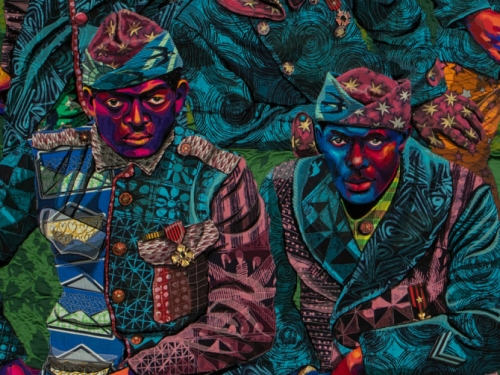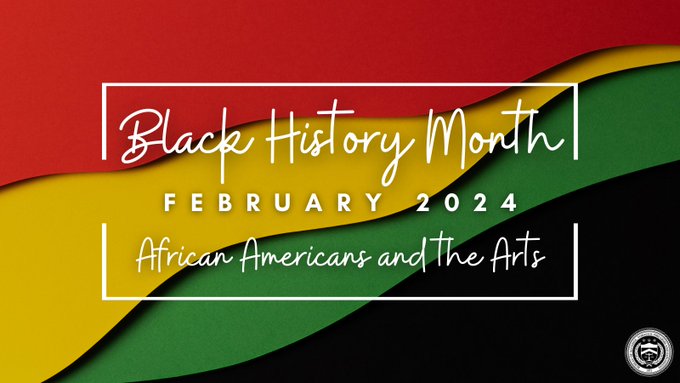Celebrate Black History Month: African Americans and the Arts
February is Black History Month, a time to celebrate the achievements of Black communities and honor the significant role and impact they have made on all facets of life and society throughout history.
As we celebrate Black History Month, let us recognize the diversity of talent and strength within our communities, acknowledging the profound impact that African Americans have made and continue to make in every facet of our society.
The 2024 theme is “African Americans and the Arts” spanning the many impacts Black Americans have had on visual arts, music, cultural movements, and more.
 An image from the Smithsonian Institution
An image from the Smithsonian Institution
Black History Month is an annual celebration of achievements by African Americans and a time for recognizing their central role in U.S. history. Also known as African American History Month, the event grew out of “Negro History Week,” the brainchild of noted historian Carter G. Woodson and other prominent African Americans. Since 1976, every U.S. president has officially designated the month of February as Black History Month. Other countries around the world, including Canada and the United Kingdom, also devote a month to celebrating Black history.
What are the three colors for Black History Month?

“The works of African Americans, in many instances shed light on the challenges faced by the African American/Black community,” said Lakreisha L. Johnson, U.S. Army South Director of Equal Employment Opportunity. “Art for the culture, in many ways, served and still serves as a way of preserving history as well as community empowerment.”
This month acts as a reflection of the tremendous contributions of Black Americans to our country. It is dedicated to acknowledging the significant impact that Black individuals and communities have had on the nation’s history, culture, and progress.
What happened on Feb 13 in black history?
What can I do for Black History Month?
8 Ways to Honor Black History Month~
- Support Black-Owned Businesses: …
- Learn About Noteworthy Black Figures and Their Contributions: …
- Donate to Charities That Support Anti-Racism Equity and Equality: …
- Purchase, Read, and Share Books by Black Authors: …
- Support and Learn About Black Women
1. Support Black-Owned Businesses:
Many Black-owned businesses still face structural racism, which poses a unique threat to their longevity and ability to serve their communities’ needs. An estimated 40 percent of Black business owners had already closed their doors between February and April of 2020. This number is twice the decline experienced by white business owners. Becoming a customer — specifically during February when these companies have a lot more visibility — is a great way to celebrate. Don’t know where to start? Online marketplace Miiriya showcases Black-owned businesses in a range of categories, from fashion, art, beauty, home decor, and more. Find other companies by searching the #blackowned hashtag online.
2. Learn About Noteworthy Black Figures and Their Contributions:
Typically, Black History Month draws associations with well-known figures like Civil Rights leader Martin Luther King, Jr. and activist Rosa Parks, but there are many others to learn about. For example, there’s Shirley Chisolm, the first Black woman elected to Congress. And Fannie Lou Hamer, a Black activist from Mississippi who launched Freedom Farm Cooperative (FFC), an initiative to purchase land that Black people could collectively own and farm. Visit BlackPast.org for an extensive list of other notable Black figures.
3. Donate to Charities That Support Anti-Racism Equity and Equality:
Given the ongoing public protests against police brutality, charities and organizations that support anti-racism equity and equality need donors to continue their collective work to seek justice for the Black community. Consider donating to the Black Youth Project, Loveland Therapy Fund, Amistad Law Project, as well as grassroots organizations that oftentimes don’t receive widespread publicity.
4. Purchase, Read, and Share Books by Black Authors:
Add Black authors to your reading list. Edward E. Baptist’s “The Half Has Never Been Told” takes an in-depth look at slavery’s role in the “evolution and modernization of the United States.” My own book, “Radical Empathy: Finding a Path to Bridging Racial Divides,” discusses the many ways that Black people are impacted by structural racism. Through storytelling, I help others not only understand the impact of racism, but also to practice empathy.
5. Support and Learn About Black Women:
I’m reminded of the impact of structural racism on the women in my family, and how they helped pave the way for me to achieve success in life. It’s incredibly important to have Black women at the table as major policies are being developed and discussed. Today, we see Black women in America taking their place at the highest levels of government. I’m so proud of the work done by women like Stacey Abrams, Kamala Harris, and thousands across the country who volunteered and got out to vote. As Amanda Gorman said in her magnificent poem on inauguration day:
We the successors of a country and a time
Where a skinny Black girl
descended from slaves and raised by a single mother
can dream of becoming president
only to find herself reciting for one
6. Listen to or Read “The 1619 Project” by the New York Times:
“The 1619 Project” is a long-form historical recounting of the role slavery played in the transformation of America. The project references the year 1619, in which the first ship carrying enslaved Africans reached the shores of the colony of Virginia. Pulitzer Prize-winning journalist and project creator Nikole Hannah Jones hosts a podcast that dissects the link between slavery and American economics, the co-opting of Black musicians’ work, and the obstacles Black people faced with receiving healthcare and land ownership rights.
7. Participate in Online Events:
Throughout the month of February, the Smithsonian’s National Museum of African American History and Culture (NMAAHC) offers a range of virtual events and conversations that affirm and preserve the accomplishments of African Americans throughout history. Check out the full offering here.
8. Attend Virtual Black History Month Celebrations:
There’s no shortage of virtual online Black History Month celebrations — from Questlove’s new animated Disney series for kids to reading up on this year’s Black History Month theme of Black health and wellness. In NMAAHC’s Black History Month toolkit, you’ll find everything from curated stories to a searchable museum to a new recipe to make at home. To find more locally-focused celebrations, check your city or state government websites for local listings for Black History Month events like online poetry events, scavenger hunts, art exhibitions, performances, and more.
McGregor and its Residents will be celebrating all month long through many programs to enjoy!
Learn More about black history month
https://blackhistorymonth.gov/

